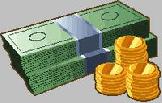
 |
|
| Financial Terms | |
| Asset-specific Risk |
|
Information about financial, finance, business, accounting, payroll, inventory, investment, money, inventory control, stock trading, financial advisor, tax advisor, credit.
Main Page: finance, inventory, investment, financial advisor, money, payroll, tax advisor, credit, |
Definition of Asset-specific Risk
Asset-specific RiskThe amount of total risk that can be eliminated by diversification by
Related Terms:Acquisition of assetsA merger or consolidation in which an acquirer purchases the selling firm's assets. AssetAny possession that has value in an exchange. Asset/equity ratioThe ratio of total assets to stockholder equity. Asset/liability managementAlso called surplus management, the task of managing funds of a financial Asset activity ratiosRatios that measure how effectively the firm is managing its assets. Asset allocation decisionThe decision regarding how an institution's funds should be distributed among the Asset-backed securityA security that is collateralized by loans, leases, receivables, or installment contracts  Asset-based financingMethods of financing in which lenders and equity investors look principally to the Asset classesCategories of assets, such as stocks, bonds, real estate and foreign securities. Asset-coverage testA bond indenture restriction that permits additional borrowing on if the ratio of assets to Asset for asset swapCreditors exchange the debt of one defaulting borrower for the debt of another Asset pricing modelA model for determining the required rate of return on an asset. Asset substitutionA firm's investing in assets that are riskier than those that the debtholders expected. Asset substitution problemArises when the stockholders substitute riskier assets for the firm's existing Asset swapAn interest rate swap used to alter the cash flow characteristics of an institution's assets so as to Asset turnoverThe ratio of net sales to total assets.  Asset pricing modelA model, such as the Capital asset Pricing Model (CAPM), that determines the required AssetsA firm's productive resources. Assets requirementsA common element of a financial plan that describes projected capital spending and the Bankruptcy riskThe risk that a firm will be unable to meet its debt obligations. Also referred to as default or insolvency risk. Basis riskThe uncertainty about the basis at the time a hedge may be lifted. Hedging substitutes basis risk for Business riskThe risk that the cash flow of an issuer will be impaired because of adverse economic Call riskThe combination of cash flow uncertainty and reinvestment risk introduced by a call provision. Capital asset pricing model (CAPM)An economic theory that describes the relationship between risk and Commercial riskThe risk that a foreign debtor will be unable to pay its debts because of business events, Company-specific riskRelated: Unsystematic risk Completion riskThe risk that a project will not be brought into operation successfully. Counterparty riskThe risk that the other party to an agreement will default. In an options contract, the risk Country financial riskThe ability of the national economy to generate enough foreign exchange to meet Country risk GeneralLevel of political and economic uncertainty in a country affecting the value of loans or Credit riskThe risk that an issuer of debt securities or a borrower may default on his obligations, or that the Cross-border riskRefers to the volatility of returns on international investments caused by events associated Currency riskRelated: Exchange rate risk Currency risk sharingAn agreement by the parties to a transaction to share the currency risk associated with Current assetsValue of cash, accounts receivable, inventories, marketable securities and other assets that Default riskAlso referred to as credit risk (as gauged by commercial rating companies), the risk that an Diversifiable riskRelated: unsystematic risk. Dynamic asset allocationAn asset allocation strategy in which the asset mix is mechanistically shifted in Economic riskIn project financing, the risk that the project's output will not be salable at a price that will Equilibrium market price of riskThe slope of the capital market line (CML). Since the CML represents the Event riskThe risk that the ability of an issuer to make interest and principal payments will change because Exchange of assetsAcquisition of another company by purchase of its assets in exchange for cash or stock. Exchange rate riskAlso called currency risk, the risk of an investment's value changing because of currency Exchange riskThe variability of a firm's value that results from unexpected exchange rate changes or the Fallout riskA type of mortgage pipeline risk that is generally created when the terms of the loan to be Financial assetsClaims on real assets. Financial riskThe risk that the cash flow of an issuer will not be adequate to meet its financial obligations. Firm-specific riskSee:diversifiable risk or unsystematic risk. Fixed assetLong-lived property owned by a firm that is used by a firm in the production of its income. Fixed asset turnover ratioThe ratio of sales to fixed assets. Flat price riskTaking a position either long or short that does not involve spreading. Force majeure riskThe risk that there will be an interruption of operations for a prolonged period after a Foreign exchange riskThe risk that a long or short position in a foreign currency might have to be closed out Funding riskRelated: interest rate risk Geographic riskrisk that arises when an issuer has policies concentrated within certain geographic areas, Herstatt riskThe risk of loss in foreign exchange trading that one party will deliver foreign exchange but the counterparty financial institution will fail to deliver its end of the contract. It is also referred to as settlement risk. Idiosyncratic RiskUnsystematic risk or risk that is uncorrelated to the overall market risk. In other words, Inflation riskAlso called purchasing-power risk, the risk that changes in the real return the investor will Insolvency riskThe risk that a firm will be unable to satisfy its debts. Also known as bankruptcy risk. Intangible assetA legal claim to some future benefit, typically a claim to future cash. Goodwill, intellectual Interest rate riskThe risk that a security's value changes due to a change in interest rates. For example, a Liquid assetasset that is easily and cheaply turned into cash - notably cash itself and short-term securities. Liquidity riskThe risk that arises from the difficulty of selling an asset. It can be thought of as the difference Long-term assetsValue of property, equipment and other capital assets minus the depreciation. This is an Limitation on asset dispositionsA bond covenant that restricts in some way a firm's ability to sell major assets. Market price of riskA measure of the extra return, or risk premium, that investors demand to bear risk. The Market riskrisk that cannot be diversified away. Related: systematic risk Mortgage-pipeline riskThe risk associated with taking applications from prospective mortgage borrowers Net asset value (NAV)The value of a fund's investments. For a mutual fund, the net asset value per share Net assetsThe difference between total assets on the one hand and current liabilities and noncapitalized longterm Non-reproducible assetsA tangible asset with unique physical properties, like a parcel of land, a mine, or a Nondiversifiable riskrisk that cannot be eliminated by diversification. Nonsystematic riskNonmarket or firm-specific risk factors that can be eliminated by diversification. Also Operating riskThe inherent or fundamental risk of a firm, without regard to financial risk. The risk that is Other current assetsValue of non-cash assets, including prepaid expenses and accounts receivable, due Overnight delivery riskA risk brought about because differences in time zones between settlement centers Policy asset allocationA long-term asset allocation method, in which the investor seeks to assess an Political riskPossibility of the expropriation of assets, changes in tax policy, restrictions on the exchange of Price riskThe risk that the value of a security (or a portfolio) will decline in the future. Or, a type of Product riskA type of mortgage-pipeline risk that occurs when a lender has an unusual loan in production or Publicly traded assetsassets that can be traded in a public market, such as the stock market. Purchasing-power riskRelated: inflation risk Quick assetsCurrent assets minus inventories. Rate riskIn banking, the risk that profits may decline or losses occur because a rise in interest rates forces up Real assetsIdentifiable assets, such as buildings, equipment, patents, and trademarks, as distinguished from a Regulatory pricing riskrisk that arises when regulators restrict the premium rates that insurance companies Reinvestment riskThe risk that proceeds received in the future will have to be reinvested at a lower potential Reproducible assetsA tangible asset with physical properties that can be reproduced, such as a building or Residual assetsassets that remain after sufficient assets are dedicated to meet all senior debtholder's claims in full. Residual riskRelated: unsystematic risk Return on assets (ROA)Indicator of profitability. Determined by dividing net income for the past 12 months Return on total assetsThe ratio of earnings available to common stockholders to total assets. Reverse price riskA type of mortgage-pipeline risk that occurs when a lender commits to sell loans to an RiskTypically defined as the standard deviation of the return on total investment. Degree of uncertainty of Risk-adjusted profitabilityA probability used to determine a "sure" expected value (sometimes called a Risk arbitrageSpeculation on perceived mispriced securities, usually in connection with merger and Risk averseA risk-averse investor is one who, when faced with two investments with the same expected Risk classesGroups of projects that have approximately the same amount of risk. Risk controlled arbitrageA self-funding, self-hedged series of transactions that generally utilize mortgage Related to : financial, finance, business, accounting, payroll, inventory, investment, money, inventory control, stock trading, financial advisor, tax advisor, credit. |